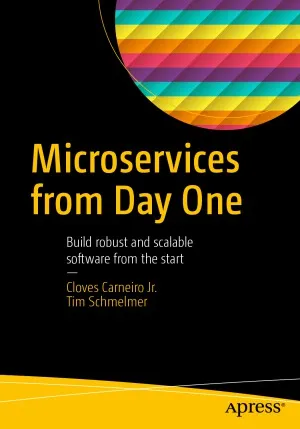Microservices Flexible Software Architecture
4.5
Reviews from our users

You Can Ask your questions from this book's AI after Login
Each download or ask from book AI costs 2 points. To earn more free points, please visit the Points Guide Page and complete some valuable actions.کتاب های مرتبط:
Introduction to 'Microservices: Flexible Software Architecture'
Microservices have taken the software development world by storm, offering a unique approach that promises to streamline processes, increase agility, and allow businesses to scale and evolve like never before. In 'Microservices: Flexible Software Architecture', Eberhard Wolff demystifies this cutting-edge organizational framework, providing invaluable insights into its application, benefits, and challenges. This book is not just a guide but a comprehensive roadmap to understanding and leveraging microservices architecture to its fullest potential.
A Detailed Summary of the Book
In 'Microservices: Flexible Software Architecture', Eberhard Wolff delves into the world of microservices, offering readers a detailed narrative on how these small, independently deployable services can create a cohesive software architecture. The book begins by explaining the fundamental concepts of microservices, comparing them to the traditional monolithic architectural style, and highlighting their advantages, such as scalability and flexibility. Wolff guides readers through the strategic implementation of microservices within an organization, addressing considerations like communication patterns, infrastructure automation, and continuous delivery practices.
Real-life examples and case studies are woven throughout the text, demonstrating how companies have successfully—or unsuccessfully—adopted microservices. This practical approach helps readers understand the real-world implications of the theoretical concepts discussed. The book also provides insights into modern technologies and tools that support microservices architecture, including containerization technologies like Docker and orchestration tools such as Kubernetes.
Key Takeaways
- Understand the core principles of microservices architecture and how it differs from traditional monolithic approaches.
- Learn how to effectively decompose an application into microservices to enhance flexibility and scalability.
- Explore the role of DevOps practices in the successful implementation and operation of microservices.
- Gain insight into the essential infrastructure components required to support a microservices ecosystem.
- Discover strategies for overcoming common challenges associated with service orchestration, data management, and inter-service communication.
Famous Quotes from the Book
"Microservices are about making applications flexible so that they can be changed faster and scaled more effectively."
"The fundamental attribute of microservices is their ability to be deployed independently, enabling organizations to adapt to change rapidly."
Why This Book Matters
'Microservices: Flexible Software Architecture' is paramount for any organization or individual striving to comprehend and implement one of the most pivotal technological advancements in contemporary software development. Eberhard Wolff's approach is both comprehensive and accessible, which means that whether you are an industry veteran or a newcomer to software architecture, this book serves as an indispensable resource. Its critical perspectives on scaling, transforming, and sustainably growing a business in today’s fast-paced digital environment make it vital reading for anyone looking to harness the power of microservices.
Moreover, the book’s inclusion of practical examples, coupled with the theoretical groundwork, ensures that readers are not only informed but also prepared to put these strategies into practice. This ability to blend theory with practice is one reason why 'Microservices: Flexible Software Architecture' remains a definitive guide and a highly respected source in the field.
Free Direct Download
You Can Download this book after Login
Accessing books through legal platforms and public libraries not only supports the rights of authors and publishers but also contributes to the sustainability of reading culture. Before downloading, please take a moment to consider these options.
Find this book on other platforms:
WorldCat helps you find books in libraries worldwide.
See ratings, reviews, and discussions on Goodreads.
Find and buy rare or used books on AbeBooks.
1505
بازدید4.5
امتیاز0
نظر98%
رضایتReviews:
4.5
Based on 0 users review
Questions & Answers
Ask questions about this book or help others by answering
No questions yet. Be the first to ask!















